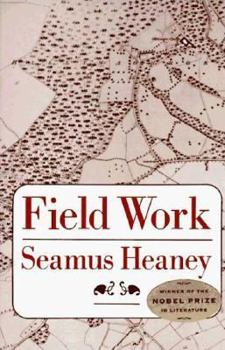Field Work
Select Format
Select Condition 
Book Overview
Field Work, which first appeared in 1979, is a superb collection of lyrics and narrative poems from one of the literary masters of our time. As the critic Dennis Donoghue wrote inThe New York Times Book Review: "In 1938, not a moment too soon, W. B. Yeats admonished his colleagues: 'Irish poets, learn your trade.' Seamus Heaney, born the following year, has learned his trade so well that it is now a second nature wonderfully responsive to his first...
Format:Paperback
Language:English
ISBN:0374516200
ISBN13:9780374516208
Release Date:April 1981
Publisher:Farrar Straus Giroux
Length:66 Pages
Weight:0.24 lbs.
Dimensions:0.2" x 5.5" x 8.2"
Customer Reviews
4 ratings
Stays with you long after...
Published by Thriftbooks.com User , 24 years ago
This was my first exposure to Seamus Heaney and his work (other than seeing the portly fellow with his unkempt white hair walking purposefully around campus here in Cambridge.) It is still my favorite collection of his work. Like all previous reviewers, I will not critique any particular poem, but only give the volume what can be one of my highest forms of praise: The poems have such a resonance that they have stayed with me long after putting the book down. That is a rare feat, in any artistic genre.
The End of Art is Peace
Published by Thriftbooks.com User , 24 years ago
"Old ploughsocks gorge the subsoil of each sense / And I am quickened with a redolence / Of the fundamental dark unblown rose." In the face of such mastery, we cannot comment or explicate, for fear of impertinence; we can only quote, and hope that something of the maker's joy communicates itself.This was the third book of poetry that this reviewer purchased as a youth, the first two being Eliot's Four Quartets and Rimbaud's Illuminations. This book remains a favourite of ours, fifteen years after its purchase.The Glanmore Sonnets occupy a central position in this slender but rich volume, as is fitting; it is perhaps Heaney's masterwork. The Elegy to Robert Lowell, the "welder of English" who composed "heart-hammering blank sonnets of love for Harriet and Lizzie" is also noteworthy.There is much about the sectarian warfare of the troubled six counties of Northern Ireland, but like Dante (who appears via epigraph and translation in this book) Heane!y can transfigure the sins of his land into glorious language that is an exemplar of poetry's redemptive potentiality. "I think our very form is bound to change ... Unless forgiveness finds its nerve and voice."There is much here about love, nuptial, natural, sexual. At the end of "The Guttural Muse," there is a couplet of exclusion from the joyful earthiness that the poet observes: "I felt like some old pike all badged with sores / Wanting to swim in touch with soft-mouthed life."There is warfare and loss, violence and bliss, the joys of the flesh and the crucifixion of a country. But after reading the poems in FIELD WORK, the reader will doubtless share in Seamus Heaney's faith that "the end of art is peace."
Digging
Published by Thriftbooks.com User , 24 years ago
With "Field Work" the metaphor of "digging" with which Seamus Heaney began his first volume of poetry ("Death of a Naturalist") has become a succinct and overarching symbol of his entire literary endeavour. In that poem "digging" comes to connote the agricultural roots of his childhood (and of the Irish people) but also the search for word-fodder that his poetry enacts. "Field Work" continues to explore these concerns in a powerful collection of poems. Here the deeply personal ("Glanmore Sonnets"), primarly poetic ("Elegy") and cautiously political ("Triptych", "The Toome Road") sit comfortably alongside one another. While Heaney (as the most famous voice in contemporary Irish literature) has been repeatedly criticised for his silence on the Ulster situation, this volume shows that (as in "North") he is able to deal with its complex issues without taking sides. Always his concern is for the impartial victim (the position he himself assumes, that of the "unmolested orchid" ["Triptych 1"]) and the place he or she occupies among the combatants. "Casualty" describes a friendly but laconic pub drinker (apolitical and an acquaintance of Heaney's) who was killed by the British for defying curfew. "Triptych 1" includes the description of "Two young men with rifles on the hill" - we do not know if they are Unionists or I.R.A., they are two sides of the same coin. Heaney's continual "digging" allows him to move beneath the emotive surface of events and to unearth their common history, culture, landscape, experience. In "Field Work" the very poetry with which Heaney draws these moments is itself a tool to pare bloody and partisan politics back to its single seed, the common root of the Irish field and furrow.
Field Work---Heaney not is Yeats successor, but conqueror
Published by Thriftbooks.com User , 27 years ago
Seamus Heaney, in "Field Work" makes accessible what is best about poetry and, especially, modern Irish poetry. Heaney's impact on modern poetry will certainly extend on into the centuries as he lays down his words in beautiful rythmic language, a language forgotten by many contemporaries, but coming back with many new poets. Heaney's protrait of Irish life, the "troubles", and just his love of people and the land makes this a must read not only for those who love good poetry, but wish to understand the beauty, people, politics, and history of a great people to be free. Heaney writes no bad poems, remains accessible to the occasional reader, and offers more than enough solid food for the critic and student of poetics to keep all happy for long after the read.





